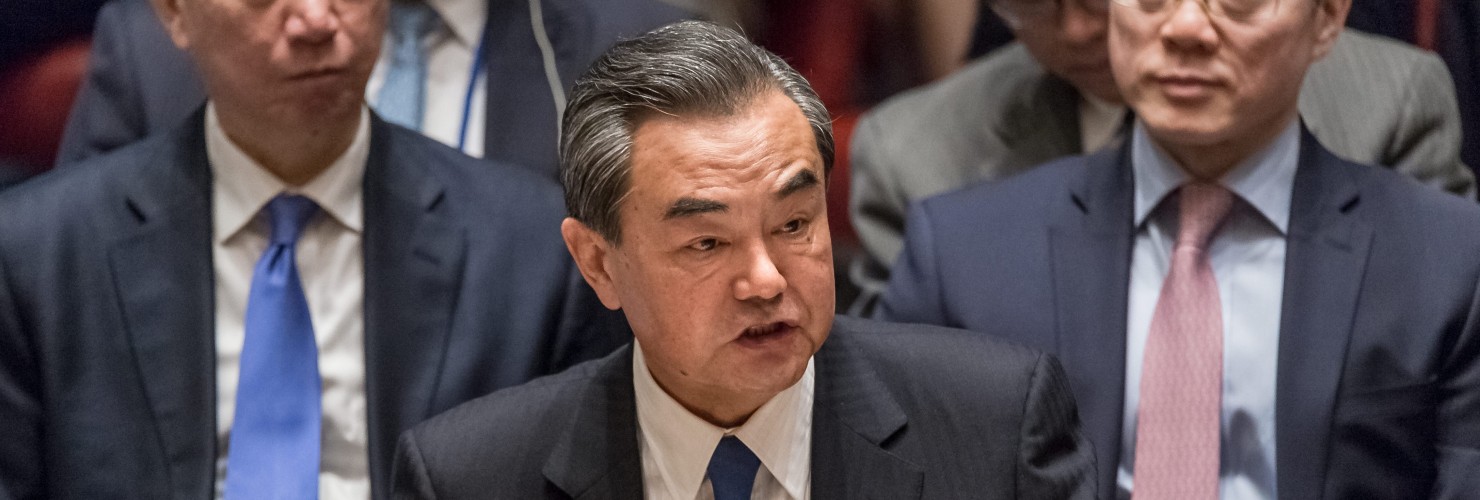

MERICS China Security and Risk Tracker
02/2022
Focus Topic
China’s Global Security Initiative seeks international buy-in for Beijing’s vision of the global order
by Helena Legarda and Grzegorz Stec
President Xi Jinping unveiled Beijing’s new international security project during the Boao Forum for Asia in late April. The Global Security Initiative (全球安全倡议- GSI) was presented amid heightened international tensions following Russia’s invasion of Ukraine. Just six months earlier Xi announced a broadly similar format, the Global Development Initiative, by video link in his annual address to the UN General Assembly. The latter is China’s blueprint for global economic development and international development cooperation.
The GSI signals the Chinese leadership’s understanding of security as well as its ambitions and vision for the future of global governance, though the blueprint is still ambiguous and short on practical details. The GSI is a policy that should be watched closely in Brussels and other European capitals, especially given that the EU has shifted its perspective and is gradually adopting systemic rivalry as the primary lens through which to view the Europe-China relationship.
A Chinese solution to international security challenges
Xi presented the GSI as a way to prevent conflicts amid the resurgence of great power competition and bloc politics, and as a vehicle to ensure the stability needed for economic recovery and development. The key objective is to “build a balanced, effective and sustainable security architecture,” he said.1
Foreign Minister Wang Yi elaborated on the content of the initiative, outlining the GSI’s core “six commitments” (六个坚持). These are: 1) a “common, comprehensive, cooperative and sustainable security concept;” 2) respecting the sovereignty of all countries; 3) adhering to the UN charter; 4) paying attention to the “legitimate security concerns of all countries;” 5) prioritizing dialogue and consultation as a means of settling disputes; 6) staying committed to maintaining security in both traditional and non-traditional domains.2
Many of these will be familiar to close watchers of China’s official narratives. In essence, the GSI is largely a repackaging of narratives that Beijing has deployed in the past – such as supporting “multipolarity” in opposition to the Western-dominated international order or linking security with development.
However, the GSI also signals Beijing’s continuing support for – and alignment with – Russia’s views of the West and the global order, by formalizing its Ukraine-related rhetoric into an export-oriented initiative that is strongly critical (albeit not explicitly) of NATO and the United States. The GSI incorporates concepts and language that have traditionally been part of Moscow’s rhetoric; in particular the GSI announcement was the first time that Xi publicly embraced the principle of “indivisible security” (不可分割的安全). The concept originally emerged in the 1970s during negotiations between the USSR and the West at the Conference on Security and Cooperation in Europe (the forerunner of the Organization for Security and Cooperation in Europe, or OSCE). Moscow has since deployed its own interpretation of “indivisible security” to criticize NATO’s “open-door” policy on enlargement as a threat to its own security. China has referred to this concept in the past. However, it has only fully incorporated “indivisible security” into its own official discourse and international positioning after the invasion of Ukraine.
The formalization of these positions is a further indication that China’s leadership perceives the war in Ukraine as playing into larger questions about geopolitical competition and how China wants to position itself vis-à-vis Russia and the West. And Beijing seems to have made a call.
Beijing is presenting the GSI project as a “Chinese solution to international security challenges.” China’s solution is contrasted to “some countries” – a clear reference to the United States – seen as clinging to Cold War thinking and undermining the international security order. The GSI provides a roadmap and ideological framework for China’s ambition to re-shape the international order which Beijing will use to seek international support and explain its positioning amid growing geopolitical tensions.
Seeking China-led reform of the global order
The announcement of the GSI coincides with a period of extreme pressure for China's leadership. Only months away from the 20th Party Congress, when Xi is expected to secure a third term as the country’s leader, Beijing confronts an economic slowdown, multiple Covid outbreaks, controversy over its “zero-Covid” policy, and rising tensions with the West due to its support for Russia’s invasion of Ukraine.
Beijing is also concerned that a US-led coalition of Western countries and allies is coalescing to oppose China. Its anxiety is evident in the increasingly strident narrative about the potential formation of an “Indo-Pacific NATO” to contain China’s rise; the term refers to fears of a US-led coalition of countries in the region targeting China, similar to NATO’s role vis-à-vis Russia, rather than to any expansion of NATO into the Indo-Pacific.
The Global Security Initiative, alongside the Global Development Initiative, are key elements of China’s response to these developments. Beijing’s preferred goal would be to build a competing bloc of countries that share China’s views on security and global governance to push back against – and eventually reform – the Western-dominated global order. Short of this, it hopes at least to limit other countries’ alignment with the United States and the West at large, and to prevent them from joining the perceived anti-China coalition.
The global turmoil caused by Russia’s invasion of Ukraine and the ensuing global economic and food crises is giving Beijing an opportunity to make headway towards this goal. Although 141 countries voted at the UN in March to condemn Russia’s aggression (while China abstained), there is still a clear gap between the perspectives of liberal democracies and how many countries in the Global South view the war, and the worsening geopolitical environment in general. The gap is evident in the lack of support for sanctions against Russia in much of the developing world, as countries prefer to prioritize their own economic stability and national interests, and the widespread reluctance to openly condemn Russia’s aggression.
Despite its increasingly open support for Russia’s positions on Ukraine, Beijing is using the GSI to present itself as the standard-bearer for a more ‘neutral’ approach to global conflicts. Unlike Western countries that provoked this conflict and are still “adding fuel to the fire”, as the official narrative of the CCP goes, China is a peaceful country that prioritizes dialogue and non-interference and is a force for stability. China’s approach to international security, embodied in the GSI, is presented by Beijing as an alternative (though ill-defined) model for all countries in any way unhappy with the Western approach.
The GSI does not represent an attempt to replace the United States or other powers as a global security provider. China is currently neither willing nor able to take on such a role. Instead, the GSI project seeks to shape global norms and the global security architecture. Ultimately, China would like to be in a position to shape the 21st century as the West shaped the 20th century. To do so, Beijing must first increase its global influence while simultaneously reducing the footprint and power of the United States and Europe.
Following the BRI template
The details of the GSI will gradually be filled out over the next few months, during which Beijing will adapt its implementation to the international environment. The GSI’s rollout will also be shaped by responses to it, as happened with the Belt and Road Initiative (BRI). Beijing can be expected to target countries in the Global South to sign onto its new initiative, a move that can demonstrate Beijing’s position on the war in Ukraine is not unique and legitimize Beijing’s response. By securing support for its own view of the global order, Beijing can thereby weaken any Western attempts to build the anti-China coalition that – the Chinese leadership fears – may emerge to contain China’s rise.
Examples of this outreach to the Global South are already emerging; initial responses to Xi’s announcement provide an indication of where the initiative is likely to resonate most. The foreign ministers of Caribbean countries with diplomatic relations with China endorsed both the GSI and GDI at a meeting with foreign minister Wang Yi on April 29.3 The Minister of Foreign Affairs of Laos, Saleumxay Kommasith, has also expressed his support.4 Meanwhile, state-owned media in Zimbabwe are calling for Africa to rally behind the GSI.5
However, Beijing will also try to secure buy-in from European countries and the wider West. Vice Foreign Minister Deng Li extended an invitation for Germany to join the GSI during his April 29 call with German State Secretary Andreas Michaelis.6 China’s Ambassador to Cyprus has also promoted the GSI, claiming it could play a role in addressing the island’s de facto partition.7 This sort of outreach is likely to become increasingly common in Europe-China exchanges, as Beijing attempts to bring more legitimacy to the GSI as a universally-beneficial model by securing the support of Western countries, copying the template of the BRI rollout.
The way forward for Europe
The EU should not miss the GSI’s significance even though the initiative remains in the early, rhetorical stages. The GSI announcement did not appear in a vacuum and builds upon a pattern of revisionist tendencies that China has been exhibiting over the last few years.
The rules-based international order is, fundamentally, a numbers game that will only hold for as long as the majority of nations consider it works in their favor, or at least not against them. Beijing’s attempts to assemble a loose ‘coalition of the dissatisfied’ around the banner of its own initiatives and norms should therefore be of concern to all liberal democracies and to any country invested in defending the current global order. Although the GSI’s evolution remains unclear, Beijing is likely to focus initial efforts on spreading its own views of security (as it has done through the Shanghai Cooperation Organization or the Conference on Interaction and Confidence-Building Measures in Asia), which it will then try to insert into UN documents by encouraging bloc voting patterns.
To put it simply, the EU must be ready to accept that systemic rivalry with China is here to stay and likely to intensify.
The EU also needs to draw on its experience with the BRI and be mindful of the new initiative’s implications from its inception. Beijing has already launched a diplomatic offensive to promote the GSI; more such efforts can be expected in the future. The EU would be wise to coordinate a united position on GSI and thus avoid the cacophony seen in member states’ initial responses to the BRI.
Similarly, the EU will also need to double down on its engagement with developing countries, which Beijing sees as the key audience for GSI rhetoric. A good start would be to give greater priority to the Global Gateway Initiative agenda, which is having a bumpy rollout with limited – and at times insufficient – consultations with partner countries. Effective responses to the GSI would also need to involve increased cooperation with countries in the Global South in the security space, ideally through the EU’s own Common Defense and Security Policy initiatives.
Amid the focus on Russia’s war on Ukraine, China’s GSI blueprint may seem like a relatively insignificant development for many across the EU. However, to borrow the metaphor coined by Rob Joyce, Director of the US National Security Agency's Cybersecurity Directorate, while the EU is occupied by the international hurricane caused by Russia, it should not forget about the international climate change facilitated by China.
Key Developments of the quarter
Domestic Stability
Multiple crises pile up to test CCP leadership ahead of 20th Party Congress in autumn
As it prepares for a major leadership reshuffle at the 20th Party Congress in autumn, the leadership is confronted by what Xi has called “many crises stacked up” (多重危机叠加). Combatting Omicron is at the forefront as officials struggle to control outbreaks in Shanghai and Beijing, China’s most populous cities, and elsewhere. Questions have arisen over the sustainability of China’s “zero Covid” policy, though Xi has called on officials to “unswervingly adhere” to zero Covid. Xi pledged the leadership would take action against those who “distort, doubt and deny our epidemic prevention policies.”
Weeks-long or, in some cases, months-long, hard lockdowns have already had profound socio-political consequences. Residents have clashed with officials over the use of strict and often arbitrary measures to curb outbreaks. Public anger has been seething, due to food shortages and lack of medical care for those forced to stay home. Such outbursts of discontent remain as local issues but could become a political risk. As more cities grapple with Omicron, harsh lockdowns, lost income, insufficient healthcare and mental health pressures stemming from isolation may all contribute to a crisis of trust.
Censors have been deployed to put a positive spin on the crisis and to block and ban critical voices, including those of experts. Leading epidemiologist Zhong Nanshan wrote that China cannot pursue “dynamic zero clearing” in the long-term; his article is now blocked. Recent remarks by WHO director general Dr Tedros Adhanom Ghebreyesus were similarly censored. After a sudden rise in online inquiries about emigration, authorities started to confiscate passports and restrict travel abroad for Chinese citizens.
Despite mounting public anger and economic slow-down, there are reasonable concerns driving China’s rigid zero-Covid policy. Low vaccination rates amongst the elderly (just over half of those over 80 are vaccinated, and only 20 percent have received a booster jab8) are compounded by less efficient vaccines as China has yet to roll out a domestic version of mRNA shots. Healthcare facilities are under-resourced, especially in less affluent areas. Mortality rates could rise quickly, as was seen recently in Hong Kong. Based on new models, widespread Covid outbreaks could result in between 1 million and 1.6 million deaths.9
China’s party-state is also caught in an ideological and political bind. It hailed its “zero Covid” strategy as a “magic bullet” and manifestation of China’s superior political system. Backtracking now would equate to admitting the regime’s shortcomings and raise questions about why it squandered the opportunity to prepare for living with Covid. Although Xi remains firmly in control of the policy agenda, there has been at least some visible contestation by public figures on some key aspects. These include the regulatory campaign directed at the private sector and official alignment with Russia. Ideological rigidity may well prevent flexibility and pragmatic action during a year of major domestic challenges and deepening international fault lines.
Security and Defense
Focus on power projection capabilities grows as fears of US-China conflict rise
China held its annual Two Sessions meetings from March 5-11, amid Russia’s invasion of Ukraine. While the war in Europe was barely mentioned during the official proceedings, Beijing did announce a 7.1 percent increase to its defense budget, a higher growth rate than 6.8 percent last year and 6.6 percent in 2020. Alongside Xi’s repeated calls to improve the PLA’s combat effectiveness, the growing military budget reveals a rising fear of future conflict with the United States as tensions over Taiwan and in the Indo-Pacific increase.
China’s leadership has been watching developments in Ukraine closely and is likely to distill lessons for any potential attack on Taiwan. Russia’s war in Ukraine will have underscored the importance of achieving a fast victory in any invasion to prevent other powers from getting involved. The key role of Western weapons shipments to Ukraine will have underscored how crucial it would be for China to isolate Taiwan from Western supplies and reinforcements. Finally, the West’s nervous reaction to Russian President Vladimir Putin’s statements about Russia’s nuclear capabilities will have given Beijing further evidence of the strategic value of nuclear weapons. China’s nuclear buildup predates Russia’s invasion of Ukraine but is now likely to gain greater momentum. A revision of the PLA’s war scenarios for Taiwan is likely, which could delay any existing timelines for forceful reunification.
Beijing also seems to be pushing ahead with plans to secure out-of-area bases or facilities ever further away from China’s borders. The security agreement signed with the Solomon Islands in April is a case in point. Although the final text of the agreement has not been released, a leaked draft states that “China may, according to its own needs, and with the consent of Solomon Islands, make ship visits to, carry out logistical replenishment in, and have stopover and transition in Solomon Islands." The accord has increased fears that Beijing may eventually establish a permanent military presence in the South Pacific.
Reports suggest that China has also approached Equatorial Guinea, the United Arab Emirates (UAE) and Cambodia over the last few months about prospects for a potential Chinese facility. In all three cases, the United States reportedly stepped in to discourage their governments from accepting China’s bid.
Geopolitical Competition
Beijing pushes back against claims of growing international isolation
Despite Western claims that Russia faces growing international isolation which could envelop China too if it continues to stand by Moscow, Beijing is pushing back with a wide-ranging diplomatic offensive. China seeks to demonstrate that it does not stand alone in its stance on the war in Ukraine and to build support for its view of the global order.
Foreign Minister Wang Yi and Defense Minister Wei Fenghe’s international travel agendas have picked up in earnest again. They have been deployed throughout Asia to strengthen relations and secure buy-in for Beijing’s (and Moscow’s) position that NATO and the United States are to blame for the current global instability. The diplomatic push has been accompanied by increasingly harsh rhetoric blaming NATO and the United States for “messing up” Europe and warnings they will do the same in the Indo-Pacific.
Beijing has also stepped up its conflict mediation activities to showcase the contrast between China’s self-styled role as a responsible global power and force for stability with the West’s “warmongering.” Wang hosted meetings seeking to stabilize the situation in Afghanistan on March 30-31. Beijing has also appointed a new Special Envoy to the Horn of Africa, tasked with promoting China’s "Initiative of Peaceful Development in the Horn of Africa.” These policy initiatives use China’s traditional approach to mediation, which revolves around high-profile tools that target the top levels of government, including host diplomacy activities, top-level visits and special envoys. This approach generates international attention for Beijing, and material for its own propaganda efforts, as well as direct access to and influence over other governments. But it has proved ineffective so far.
China’s position on Russia’s invasion of Ukraine has been largely pro-Moscow since the war began on February 24, despite Beijing’s claims of neutrality.
A few dominant themes have emerged in China’s assessment of the situation. China supports Russia’s “legitimate security demands” and opposes the imposition of sanctions. China has called for the sovereignty and territorial integrity of “all countries” to be respected, but it has avoided directly expressing support for Ukraine’s territorial integrity. And China has identified NATO enlargement and US “hyping of tensions” as one of the main causes of this crisis.
For China’s leadership, the war in Ukraine is not just about the future of that country. Rather, it plays into larger questions about how China wants to position itself vis-à-vis Russia and the West. Geopolitical competition with the US will therefore remain the critical reference point for any future Chinese action.
Going forward, Beijing is likely to continue to stand by Russia rhetorically and diplomatically, while trying to minimize its potential exposure to secondary sanctions and any potential damage to its economic relationships with vital partners in the West. China will provide Russia with an economic lifeline to prevent the immediate collapse of its economy and to prop up Putin’s hold on power. But support for Russia will focus on areas that don’t threaten China’s strategic interests and stability. Direct military aid remains highly unlikely.
European countries have also become targets of Beijing’s diplomatic push. China’s relations with many European countries have deteriorated significantly, along with public attitudes towards China, because of Beijing’s tacit support for Moscow. The party is therefore directing fresh efforts to bring ties with the EU back on track. It is trying to rectify the damage done by its misreading of the European mood over Russia’s war in Ukraine. However, it also hopes to weaken the renewed transatlantic alignment that has emerged. The EU and China failed to agree on any concrete deliverables during their April 1 Summit. However, readouts suggest that China’s leaders were looking for an opportunity to return to a cooperative agenda, despite irritants in the relationship. Xi was more explicit about this during a call with French President Emmanuel Macron in May, when he warned against “bloc confrontation.” Xi expressed support for European countries keeping European security in their own hands – a clear reference to his wish to see Europe distance itself from the United States.
Economic and Tech Security
Omicron outbreaks impose massive, unpredictable economic costs and disruptions
The Omicron wave hit Shanghai hard, but outbreaks are far more widespread. To limit further spread, many provincial and local governments have put obstacles in the way of travel into and even across their jurisdictions. As the outbreak spreads, China is experiencing rolling, localized lockdowns, with some cities closing down as others open back up. Economic recovery and supply chain impacts are likely to prove far more difficult than during the coordinated nationwide lockdown in 2020.
The European Union Chamber of Commerce in China published a flash survey on the impact of the Omicron wave. Business sentiment is in the dumps, and supply chain and demand disruptions are impacting 92 percent of companies, including in areas without a major outbreak. Supply chain disruptions are the worst since early 2020, and likely to impact Europe from mid-May. Ships due to arrive in Europe then are being delayed in locked down ports like Shanghai. Finally, there has been a rapid exodus of foreigners fleeing the restrictions. The further loss of already devastated people-to-people ties is likely to do more damage to communication between China and the rest of the world, and risks adding to lack of clarity and the possibility of miscalculation.
Allied export controls against Russia bring new potential risks for China’s tech security
Sweeping restrictions have been imposed on technology exports to Russia and Belarus by the US, EU and allies acting in response to the invasion of Ukraine. Previously, Washington had used unilateral measures to curb sensitive technology transfers to Chinese firms, most notably Huawei, including through extraterritorial jurisdiction that caused frictions with partners. Beijing will be watching the newly found consensus among some of the leading technology producing nations with anxiety.
China’s government and tech firms have trodden carefully so far, despite much speculation that China would help Russia out. Tech firms like Lenovo and Xiaomi have quietly halted shipments to Russia, the Wall Street Journal reported. China’s exports of computers, smartphones and telecom base stations to Russia fell sharply in March from February, according to China’s official trade data. Beijing officially opposes the sanctions, but the so-called Foreign Direct Product Rules de facto prohibit Chinese firms from supplying Russia with any items made with US equipment or software. US government officials have warned that violations would trigger secondary sanctions, potentially curtailing China’s access to much-needed foreign technology. Despite the “blocking provision” in China’s Anti-Foreign Sanctions Law, Beijing is likely to tolerate and even encourage compliance with foreign controls so long as they do not harm national security and economic interests.
The success of sanctions in crippling Moscow’s access to foreign technology will reinforce the Chinese leadership’s commitment to technological indigenization. The prospect that China could face coordinated export controls someday, especially if it attacks Taiwan, now looks more realistic.
Looking forward: What to watch in the months ahead
- In the coming months: The second iteration of the High-Level Digital Dialogue between the European Commission and Chinese officials is supposed to convene, although no date has been announced. It is unlikely to mitigate the sharp divisions on digital governance, cyber and ICT policy between the two sides.
- June 4: In-person memorials for the 33rd anniversary of the Tiananmen massacre have been banned in Macau and Hong Kong. Police and security personnel are likely to be out in force. Last year hundreds gathered in Hong Kong to mark the event, despite similar restrictions.
- June 26-28: The G7 Summit takes place in Germany. The summit is likely to focus on Russia and Ukraine, but leaders are also expected to assess progress with the Build Back Better World (B3W) initiative, the G7’s competitor to the BRI launched at the 2021 summit.
- June 29-30: NATO leaders meet in Madrid and present the new Strategic Concept. China is likely to be discussed alongside Russia as one of the future challenges for the Alliance and NATO’s Indo-Pacific partnerships are likely to play a key role.
- Endnotes
-
1 https://www.fmprc.gov.cn/mfa_eng/zxxx_662805/202204/t20220421_10671083.html
2 http://opinion.people.com.cn/n1/2022/0424/c1003-32406751.html; https://www.fmprc.gov.cn/mfa_eng/zxxx_662805/202205/t20220505_10681820.html
3 https://www.fmprc.gov.cn/mfa_eng/xwfw_665399/s2510_665401/2511_665403/202204/t20220429_10680765.html
4 https://m.thepaper.cn/baijiahao_17937018
5 https://www.herald.co.zw/africa-should-rally-behind-chinas-global-security-initiative/
6 https://www.fmprc.gov.cn/mfa_eng/wjbxw/202204/t20220430_10680965.html
7 https://cyprus-mail.com/2022/05/03/chinas-wisdom-and-solution-for-global-security-governance
8 https://www.bloomberg.com/news/articles/2022-03-18/only-half-of-chinese-aged-80-and-older-are-fully-vaccinated
9 https://www.theguardian.com/world/2022/may/11/lifting-zero-covid-policies-in-china-could-risk-16m-deaths-says-study





